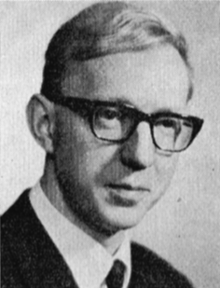Bengt Ingemar Samuelsson (21 May 1934 – 5 July 2024) was a Swedish biochemist. He shared with Sune K. Bergström and John R. Vane the 1982 Nobel Prize for Physiology or Medicine for discoveries concerning prostaglandins and related substances.[3][4]
Bengt Samuelsson | |
|---|---|
 | |
| Born | Bengt Ingemar Samuelsson 21 May 1934 Halmstad, Sweden |
| Died | 5 July 2024 (aged 90) |
| Alma mater | Lund University |
| Known for | Prostaglandins |
| Awards |
|
| Scientific career | |
| Fields | Biochemistry |
Education and early life
editSamuelsson was born in Halmstad in southwest Sweden, studied at Lund University, and was a professor in medical and physiological chemistry at Karolinska Institute in Stockholm in 1973. He was president of Karolinska Institute from 1982 to 1995 and chairman of the Nobel Foundation from 1993 to 2005.
Research and career
editThis section needs additional citations for verification. (July 2024) |
Discussing the role of prostaglandins in the body, Samuelsson explained, "It's a control system for the cells that participates in many biological functions. There are endless possibilities of manipulating this system in drug development."
His research interests were originally in cholesterol metabolism with importance to reaction mechanisms. Following the structural work on prostaglandins along with Sune Bergström he was interested mainly in the transformation products of arachidonic acid. This has led to the identification of endoperoxides, thromboxanes and the leukotrienes, and his group has chiefly been involved in studying the chemistry, biochemistry and biology of these compounds and their function in biological control systems. This research has implications in numerous clinical areas, especially in thrombosis, inflammation, and allergy.
This field has grown enormously since those days. Between 1981 and 1995, about 3,000 papers per year were published that specifically used the expression "prostaglandins," or related terms such as "prostacyclins," "leukotrienes," and "thromboxanes," in their labels and titles.
Samuelsson had served as a director on the boards of Pharmacia AB, NicOx SA, and Schering AG, and was an advisor to the venture capital fund HealthCap.
Death
editAwards and honours
editIn 1975, Samuelsson was awarded the Louisa Gross Horwitz Prize from Columbia University together with Sune K. Bergström. He was elected a Foreign Member of the Royal Society (ForMemRS) in 1990.[1]
References
edit- ^ a b "Professor Bengt Samuelsson ForMemRS". London: Royal Society. Archived from the original on 8 November 2015.
- ^ "Bengt Samuelsson, Biochemist and Nobel Laureate, Is Dead at 90". www.nytimes.com. 16 July 2024. Retrieved 16 July 2024.
- ^ Raju, T N (1999), "The Nobel chronicles. 1982: Sune Karl Bergström (b 1916); Bengt Ingemar Samuelsson (b 1934); John Robert Vane (b 1927)", Lancet, vol. 354, no. 9193 (published 27 November 1999), p. 1914, doi:10.1016/s0140-6736(05)76884-7, PMID 10584758, S2CID 54236400
- ^ Swedish Medical Association's Jubilee Award
- ^ "Dödsannonser - DN.se".
- ^ "Svenske Nobelpristagaren Bengt Samuelsson död". www.aftonbladet.se (in Swedish). 7 July 2024. Retrieved 8 July 2024.
- ^ "The Nobel Prize in Physiology or Medicine 1982". NobelPrize.org. Archived from the original on 5 April 2024. Retrieved 8 July 2024.
External links
edit- Bengt I. Samuelsson on Nobelprize.org including the Nobel Lecture From Studies of Biochemical Mechanisms to Novel Biological Mediators: Prostaglandin Endoperoxides, Thromboxanes and Leukotrienes